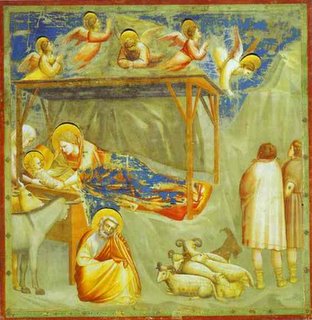 Giotto, 1304-1306.
Giotto, 1304-1306.This was one of the readings at my church's Women's Lessons and Carols service tonight. I don't know the source, but it was a quietly powerful reading. Even those of us who love the traditional Lessons and Carols service that originated at King's College Chapel Cambridge and is reprised in churches all over the world during Advent have to acknowledge that its litany follows the patriarchal traditions of the Bible. This alternative service, with a different selection of readings and music, lends itself to a different frame of reference.
"Long ago, women of wisdom from all over the earth began to gather together: mothers and grandmothers, sisters and daughters, cousins and aunts. They converged in order to witness and to midwife the birth of a holy little girl-child of mid-Eastern descent . . . perhaps an Iraqi.
This was distressing to the Herods of the earth, who are ever distressed and fearful when women gather together: the male Herods because of their fear that someone might displace them, and the female Herods because someone else might be the fairest of them all. The Herods asked the wise women where the child was to be born: 'Return and tell us,' they said, 'so that we may worship too!' (In other words, give us your wisdom.")
The wise women went on and found the place and helped the birth to come about. And they brought with them gifts -- corn, squash, beans, and bread -- these symbolizing the interconnectedness of all of life, gifts that could be used to feed the whole world.
So instead of the ancient gifts we've been told were brought -- gold for royalty, frankincense for worship of divinity, and myrhh for the embalming of the dead -- these women brought other gifts. Instead of royalty, they brought humility. Instead of worship, they brought partnership. Instead of death, they brought the knowledge of how to live.
And when they had offered their gifts, knowing that they dare not go back to Herod and to the old ways, they made their home with this child. . . and thereby came home in a different way.
Because of that, there was no slaughter of the innocents -- and no Rachel weeping for her children."
















4 comments:
I cannot tell you how much I love this.
Yes...women would certainly be practical and life-affirming.
this is so beautiful and made my day better. Thank you for sharing as it is new to me.
Lovely.
judi
What a wonderful story.
Post a Comment